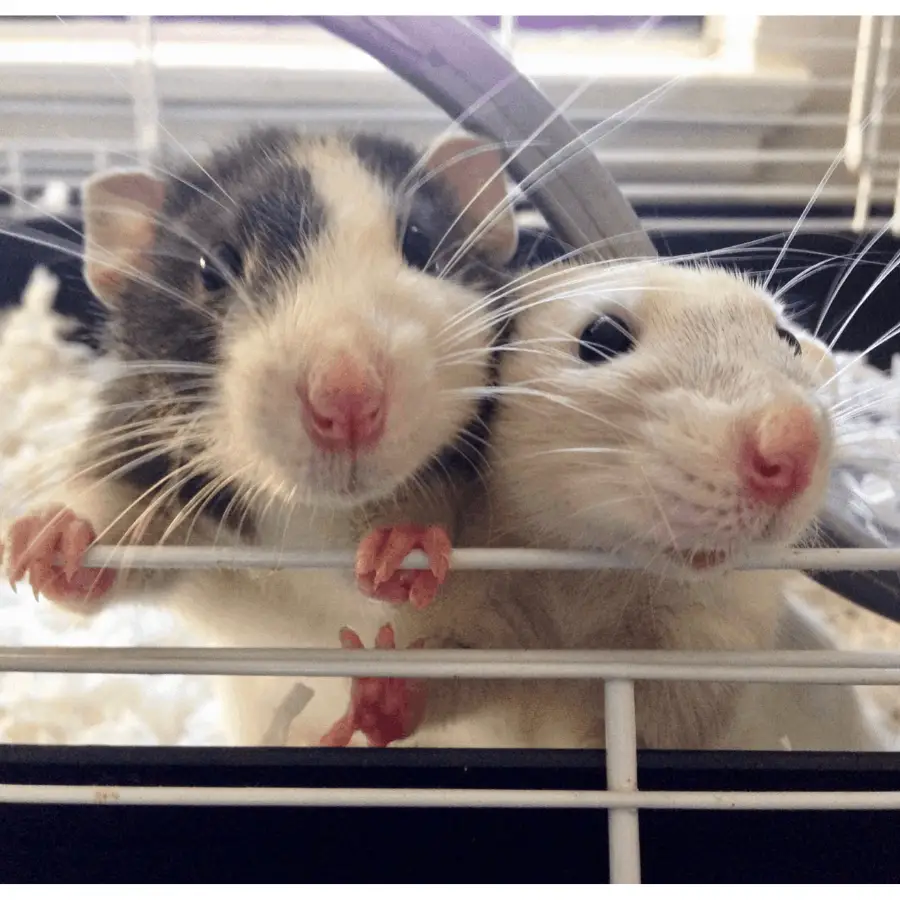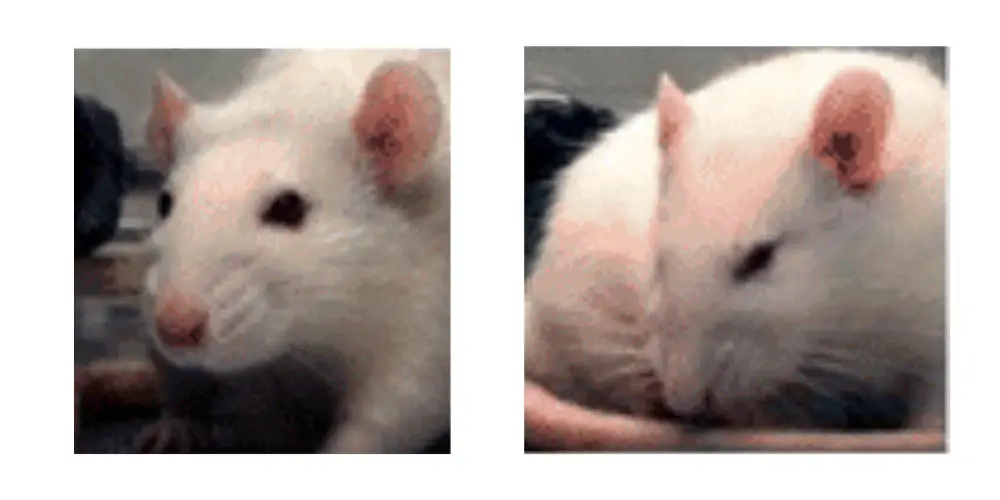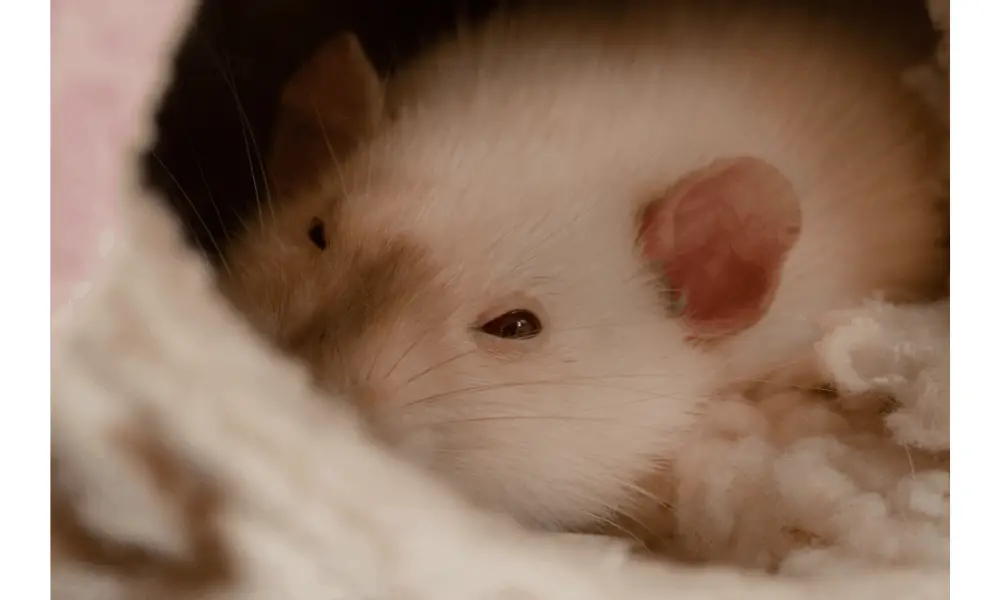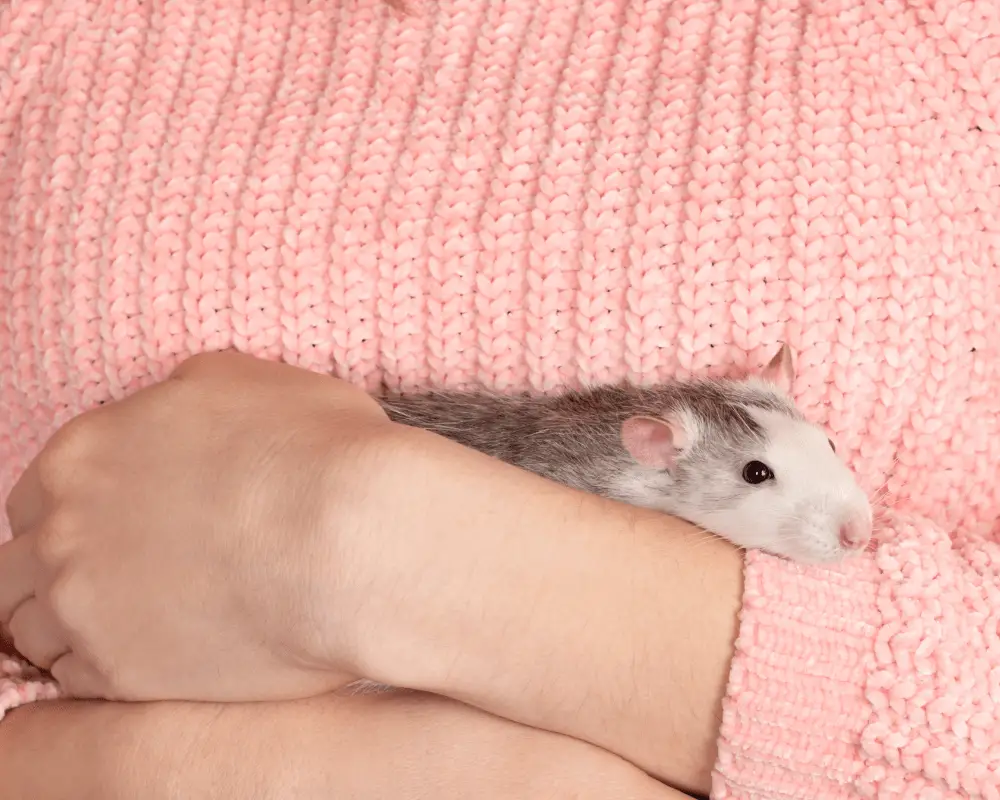Do pet rats really feel sadness after the loss of a mate or are we just humanizing rats beyond their true emotional capabilities? Do you need to do anything to help your pet rat after the passing of a cage mate? Opinions will differ widely but there are many scientific studies that can help us answer these questions.
Rats commonly show changes in behavior after the loss of a long-term cage mate (Price and Wincewicz, 2016). This indicates that rats grieve the loss of a fellow rat. A study also found that rats can show empathy (Bartal et. al., 2011). Rats are capable of experiencing basic emotions such as joy, sadness, empathy, and grief.
Rats have been the subjects of numerous behavioral studies and are a popular model to test the efficacy of human antidepressants. We can definitely not apply the full array of human emotions to rats, but many scientific studies have shown emotions linked to specific facial expressions and behavior in rats. How does this apply to your pet rat if they might be going through a change or loss?

How Are Emotions in Rats Identified?
Many may argue that all animals’ actions are fundamentally altruistic. Everything an animal does is because it will benefit themselves in some way. Believers of this concept may defend it with the ”survival of the fittest” theory. This essentially implies that the drive behind any animal action is to survive and to reproduce.
Emotions such as care, happiness, and anger have been identified in primate species a long time ago, but research within the last 2 decades has found that pet rats are far more capable of emotions than what was first believed. But surely this is old news to pet rat owners!
Facial Expressions In Rats indicating Positive or Negative Emotions
Facial expression in rats has been closely studied by (Finlayson et al., 2016) and (Sotocina et al., 2011). These studies have linked certain facial expressions to certain emotions. A happy and relaxed rat, for example, will have open eyes, with ears sitting widely apart and relaxed on either side of the head and open. A rat that is experiencing pain will have slanted eyes and folded pinched-up ears. It was also, not surprisingly, shown that rats can read the facial expressions of other rats.
It is interesting to note that ear and nose color was also closely related to emotional status with positive emotions correlating with pink ears and nose and negative emotions with a pale nose and ears. (Finlayson et al., 2016).

Do Pet Rats Grieve The Loss of a Fellow Rat?
When a rat is suddenly removed from its cagemates or finds itself alone, is it just stressed due to the abrupt change in environment, or do they truly feel grief and sadness?
A rat that has lost a long-term cage mate will show changes in behavior linked to grieving such as reduced appetite and activity level. Unwillingness to play and socialize. These changes in behavior are usually temporary but the duration can vary greatly from rat to rat.
A study on animal bereavement was done (Dutton, 2010) whereby 12 pairs of rats’ ability to keep swimming for a certain period of time was measured. The swim test consisted of putting the rat in a bucket of water and letting it swim for a couple of minutes. As soon as the rat started showing latency in its swimming efforts, the experimenter will take the rat from the water and dry it off.
The study found that after separating the pairs for 4 days after they have shared the enclosure for months, the rats gave up swimming much sooner than before separation. After reuniting the rats, they were able to keep swimming for much longer again and could swim for similar times as before separating the pairs.
It was also observed in this study that the rats were less active in their enclosures when separated. This experiment proves that rats do develop relationships with cagemates and that separating cagemates results in a decrease in willingness to swim which translates to bereavement after the loss of a cage mate.
How Long do Pet Rats Grieve?
This varies widely. It is heavily dependant on how long the rats have been cagemates for and on individual rat temperament. Older rats or rats that have known each other for long periods of time will commonly grieve for much longer compared to youngsters who have only known each other for a couple of months.
Do Pet Rats feel Empathy?
An interesting study (Bartal, Decety and Mason, 2011) was done to look at the social behavior of rats when faced with a restrained cage mate. The rats were allowed to roam free in an area where another rat was restrained in a cage. It wasn’t long before the free-roaming rat figured out how to open the cage of the restrained rat to set it free.
Even when faced with both a chocolate treat and a trapped cagemate in two separate restrainers, the free-roaming rat in question typically freed the trapped cagemate, retrieved the chocolate, and then shared the chocolate treat with the other rat.
This study was groundbreaking in the sense that it proved that rats can show empathy for a fellow rat and chose to help the other rat before helping itself to a chocolate treat. This goes against the ”survival of the fittest” theory to which most non-primate animal species have been held.
Another interesting finding by this study was that even though the rats were not trained to open the cage to free the cagemate previously, they proceeded to try and figure out how to open the difficult lock. They were motivated by something internal- they kept trying to open the cage doors – and it took most of the participating rats a few tries to learn how to open it.
In many previous (and ethically questionable studies), one rat was made to experience pain, and another rat’s response to the one in pain is noted, but in this specific study, the trapped rat did not experience any pain or discomfort. This proves that rats do feel and act on empathy, an emotion previously believed only to be experienced by primates.
One Pet Rat died. Will the Remaining Rat be Lonely?
Rats are incredibly social animals and changes in behavior after being left as an only rat are very common. If a rat that has shared its enclosure with one or more rats suddenly finds itself as an only rat, is likely to experience loneliness or grief.
Some rats will be able to adapt to the change within a few days and others will show signs of grief or sadness for a few months. Older rats seem to cope less well with losing a long-term partner than younger rats do.
If possible, getting a new rat or two will help alleviate the situation. If you have an older rat, getting a youngster might not be the best idea as the older rat will likely not be as energetic and playful as the youngster which could result in conflict. You can consider getting two youngsters instead so that the younger ones can keep each other busy and when the time comes for the older one, you can avoid having a single rat again. But, if getting two youngsters is not an option, consider adopting an older rat as a partner. Follow a slow step-wise introduction in order to avoid aggression when introducing a new rat.

Signs That your Rat is Sad
An unhappy rat will have reduced appetite and activity levels. They will be less playful and tend to avoid social contact or even show aversion to social contact. Some rats will appear anxious or restless. In severe cases, they will lose body condition and become more susceptible to illness.
Rats are often very food-driven. If there is a sudden change in their liking for food after a cagemate is lost, it might be an indication that they are experiencing grief and is often the first sign we see in pet rats who are feeling down. If your pet rat refuses to eat for more than a day, it will be in his best interest to get him/her checked out by a vet as this can have a serious impact on their health.
A pet rat that used to love to play and now refuses to come to you for the belly tickles they used to love or sits separate from other cage mates, and in general just withdraws from playtime are also experiencing grief or stress.
How to Cheer up a Sad Pet Rat
If your pet rat recently lost a long-term cage mate, the best you can do is provide extra love and attention.
Make sure there are plentiful treats and toys such as rawhide and rope toys to chew or boxes and tunnels to explore. Hide their favorite treats in their enclosure to encourage them to explore and be more active.
Spend time cuddling or tickling them – whatever type of game or affection they particularly enjoyed previously – make sure they get plenty of that activity!

Conclusion
Grief and sadness after the loss of a long-term cagemate are to be expected and there’s no need to feel guilt as a rat owner. In most cases the change in behavior is temporary and there are a few things you can do to help your pet rat cope.
Rats are amazing and intelligent animals and they have helped us to understand many complex psychological concepts. Rats are proven to be much more emotionally complex than was originally thought by numerous scientific studies. Just ask any rat owner- they can attest to this!
Resources
- Bartal, I., Decety, J. and Mason, P., 2011. Empathy and Pro-Social Behavior in Rats. Science, 334(6061), pp.1427-1430. https://science.sciencemag.org/content/334/6061/1427
- Dutton, Lindsay Kalin (2010) “A model of animal bereavement with pair-housed male rats using the forced swim test model of depression,” Modern Psychological Studies: Vol. 15 : No. 2 , Article 6. https://scholar.utc.edu/mps/vol15/iss2/6
- Finlayson, K., Lampe, J., Hintze, S., Würbel, H. and Melotti, L., 2016. Facial Indicators of Positive Emotions in Rats. PLOS ONE, 11(11), p.e0166446. https://journals.plos.org/plosone/article?id=10.1371/journal.pone.0166446
- Makowska, I. and Weary, D., 2013. Assessing the emotions of laboratory rats. Applied Animal Behaviour Science, 148(1-2), pp.1-12. https://www.sciencedirect.com/science/article/abs/pii/S0168159113001913
- Sotocina, S., Sorge, R., Zaloum, A., Tuttle, A., Martin, L., Wieskopf, J., Mapplebeck, J., Wei, P., Zhan, S., Zhang, S., McDougall, J., King, O. and Mogil, J., 2011. The Rat Grimace Scale: A Partially Automated Method for Quantifying Pain in the Laboratory Rat via Facial Expressions. Molecular Pain, 7, pp.1744-8069-7-55. https://journals.sagepub.com/doi/full/10.1186/1744-8069-7-55
